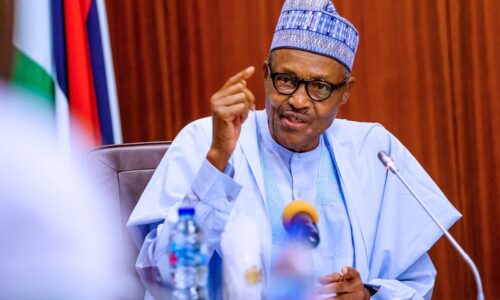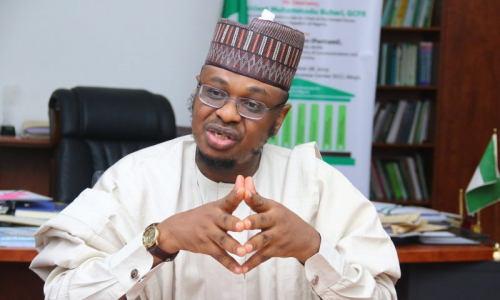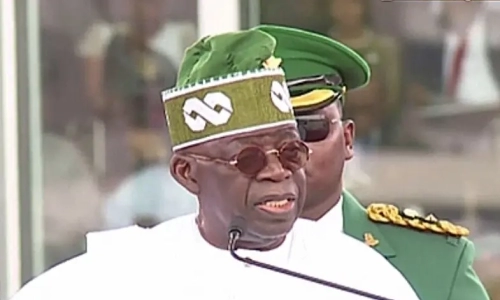THE EXECUTIVE 14/09/2022
Buhari Hails CBN, NDIC, NAICOM, Others on Financial System Stability

President Muhammadu Buhari yesterday commended the Central Bank of Nigeria (CBN), alongside the Nigeria Deposit Insurance Corporation (NDIC), the National Insurance Commission (NAICOM) and the Securities and Exchange Commission (SEC), including other critical stakeholders for the apex bank’s diligent work aimed at ensuring financial system stability over the years.
Buhari, further assured that his administration would continue to support the entire banking and finance industry in all appropriate ways to ensure it continues to deliver on mandates while creating value innovation for customers.
The president gave the commendation at the opening of the 15th Annual Banking and Finance Conference with the theme: “Repositioning the Financial Services Industry for an Evolving Glocal Context,” held in Abuja.
Buhari, also said the government was committed to securing lives and property within the country and would not relent in ensuring a safe and secure environment for citizens as well as productive activities to thrive, noting that the menace of terrorism and banditry had been plaguing the country over the years.
He said, “Indeed, the fight to rid our country of banditry, kidnapping, and insurgency is being intensified at all fronts.”
Also, on the rising inflation, which had continued to cause increasing hardship for Nigerians, the president assured that his administration had over the years implemented several policies to combat inflation including an increase in Monetary Policy Rates (MPR) as well as a 30 per cent markup on savings rates.
He said these policies were geared towards mopping up excessive liquidity in the economy while encouraging savings and investment, stressing that government would continue to cushion these adverse effects through its social safety net programmes.
However, he said the government would continue to formulate and implement policies that are aimed at promoting self-sustenance in critical areas including energy, agriculture, health, and technologies, adding that the outputs of the conference would be valuable in shaping relevant policy initiatives.
Buhari, who was represented at the ceremony by the Minister of Finance, Budget and National Planning, Mrs. Zainab Ahmed, pointed out that the annual conference of the CIBN, among other things, provides a credible annual platform for a holistic review and evaluation of the performance of the sector by industry practitioners and regulators while charting the path for the future.
This, he said, explains why his administration had always ensured that government participation at the conference is at the highest possible level.
Buhari also expressed the need for a Nigeria of the future that harnesses her strengths, competences, and cultural diversity to confront current challenges plaguing the people, ranging from climate change to pandemics and insecurity.
Buhari, specifically noted that the theme of the conference was particularly relevant considering the need to constantly adapt internationally acceptable best practices to improve the efficiency and effectiveness of the sector in playing its primary role of holding financial assets, financial intermediation and capital formation.
He said the expediency of discussions on repositioning the sector within an evolving global context cannot be over-emphasised as it stands to benefit from the experiences of other nations in navigating through emerging issues such as the fall-out from the COVID-19 pandemic and the ongoing Russian-Ukraine war which have global implications on financial service delivery in local economies.
He said under the new regime, the role and significance of the finance industry cannot be overstated in driving economic prosperity by providing opportunities to create SME start-ups, expand existing business interests and create more jobs thereby pushing the local brand overseas to frontier markets.
The president added that repositioning the finance services industry involved valuable innovations to ensure global solutions reach local indigenous customers.
He said the recently executed African Continental Free Trade Agreement (AfCFTA) represented a typical reference point as the deal creates a continent-wide market embracing 55 countries with 1.3 billion people and a combined GDP of $3.4 trillion.
Buhari said the first phase of the regional trade agreement, which took effect in January 2021, would gradually eliminate tariffs on 90 per cent of goods and reduce barriers to trade in services.
He pointed out that the finance sector would serve not just as an intermediary for lenders and borrowers but in creating a new ecosystem consisting of platforms where ordinary Africans can buy and sell their locally made products despite currency disparity as being practiced on the Pan-African Payment and Settlement System (PAPSS), a brainchild of Afrexim Bank.
Buhari, among other things, noted that over the past seven years, his administration had through various initiatives supported the repositioning of the Nigerian economy within an evolving ‘glocal’ context.
He further listed the intervention measures to include support of Nigeria’s creative industry and indigenous Small and Medium-sized businesses as well as the agricultural sector which have enhanced the capacity of indigenous enterprises to compete with their counterparts from other countries., adding that these efforts would be sustained and extended to more sectors of the economy.
He said the resolution of global issues within the local context would continue to give impetus for economic prosperity in local communities, adding that climate change, eroding purchasing power due to inflation and insecurity are currently being tackled at both local and global levels.



